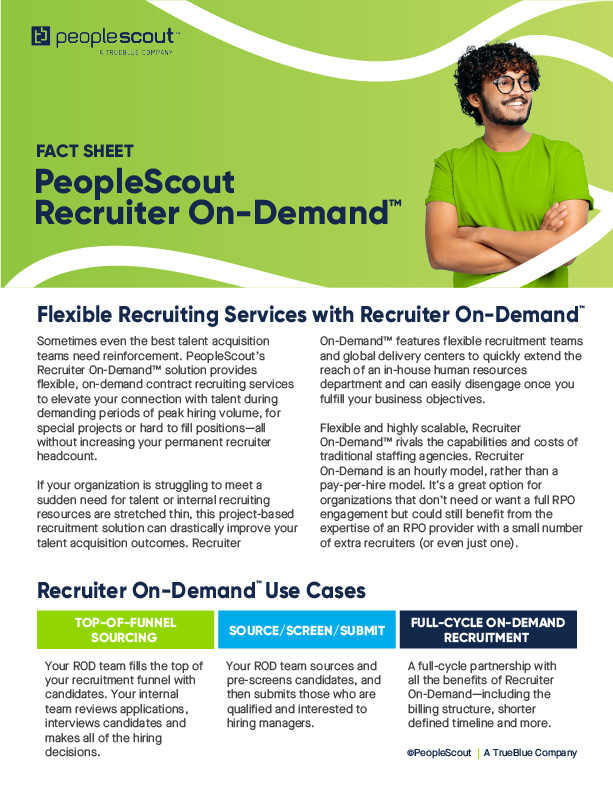By Jo Taylor, Head of RPO, EMEA
Employers face persistent challenges in talent acquisition and require agile solutions to address hiring needs efficiently. Despite a hiring slow down, demand continued to outpace supply toward the end of 2024, the ratio of job openings to unemployed workers is shifting closer to 2019 levels. This talent shortage is exacerbated by demographic shifts, with nearly four million workers having permanently exited the traditional labor force since 2020.
Organizations increasingly find themselves without sufficient recruitment infrastructure—both in human capital and technological capabilities—to navigate the complexities of today’s talent marketplace. With technical skills gaps widening and evolving rapidly, internal recruitment teams struggle to effectively manage the entire candidate journey. The consequences are clear: diminishing talent pipelines and rising instances of candidate disengagement between offer acceptance and official start dates.
It’s no surprise then that 59% of leaders report having difficulty finding qualified talent. In response, forward-thinking companies are turning to flexible recruitment process outsourcing (RPO) solutions as a strategic approach to enhance their talent acquisition capabilities precisely where support is most valuable.
That’s why we’re thrilled to announce our new suite of modular solutions, Amplifiers™. There’s an option for every organization offering targeted recruitment support to meet your immediate talent needs while delivering sustainable business advantages in today’s competitive marketplace.
What is Modular RPO?
Modular RPO, or variable RPO, is a strategic approach to managing the recruitment process in an ultra-focused manner. It involves outsourcing specific components of the recruitment process to an RPO provider, or as a supplement to an existing outsourced recruitment engagement, providing quick access to targeted and customized recruitment support. With a modular or à la carte approach, you choose from a range of services based on your requirements.
Our Amplifiers include:
- Talent Mapping
- Talent Sourcing
- Recruiter On-Demand
- Assessment Transformation
- Talent Diagnostic
- Organizational Culture & EVP Diagnostic
- Sure Start: Retention and Onboarding Support
- Technology Diagnostic
- Project Management
Modular RPO vs Full End-to-End RPO
Modular RPO differs from traditional enterprise RPO in that it allows businesses to select and customize the specific recruitment services they need, rather than outsourcing the entire process.
The main differences include:
- Scope: Modular RPO focuses on specific parts of the recruitment process or short-term initiatives, while end-to-end RPO can cover the entire recruitment function.
- Duration: Modular RPO engagements are typically short-term, while end-to-end RPO is a long-term strategic partnership. However, many of our RPO partnerships at PeopleScout have started as short-term engagements.
- Technology Integration: End-to-end RPO often involves more extensive use of technology, including integration with other HR systems as well as customization.
The decision between modular RPO and a full RPO engagement depends on various factors, including organization size, hiring volume, budget and strategic workforce planning. It’s essential to assess your specific needs and evaluate the benefits and trade-offs associated with each approach before making a decision.
6 Benefits of Modular RPO
Here are six key benefits of a modular approach to RPO.
1. Cost Optimization
Modular RPO gives you greater control over your recruitment costs. You select specific recruitment services based on your challenges, enabling you to allocate your budget more efficiently by avoiding unnecessary expenses for unused services. In uncertain economic times, this is a more cost-effective approach that still lets you benefit from the expertise of an RPO partner.
2. Scalability and Agility
The business landscape is unpredictable, which can cause your hiring needs to fluctuate rapidly. Modular RPO provides the agility to scale your recruitment capabilities up or down based on demand. You can quickly adapt your recruitment efforts in response to market conditions, ensuring you have the adequate resources during high-demand periods and avoiding unnecessary expenses during slower periods. Plus, some of our clients have added Amplifiers onto their full RPO engagement—whether they’re partnered with PeopleScout or another RPO—when an extra boost is needed.
3. Customization and Control
Some organizations prefer to maintain a certain level of control over their recruitment process, particularly during uncertain economic times. With modular RPO, you can customize your recruitment process according to your specific requirements. Select the services you need, such as candidate sourcing, screening or onboarding support, while retaining oversight of other aspects of the recruitment process. This level of control allows companies to align the outsourced services with their internal hiring strategies and maintain greater mastery of their talent acquisition function.
4. Strategic Focus
By outsourcing specific recruitment functions to an RPO partner, you can free up your internal HR teams and hiring managers to focus on core business activities, such as talent development, workforce planning and organizational restructuring. By opting for a modular approach, organizations can collaborate with their RPO partner to design a solution that addresses their specific challenges and aligns with their strategic goals.
5. Access to Technology
RPO providers have access to advanced recruitment technologies and tools. Even with modular RPO, you can leverage these technologies for specific recruitment functions without investing in them for internal use. This is particularly beneficial in challenging economic environments where capital expenditures are carefully managed.
6. Risk Mitigation
In uncertain economic climates, modular recruitment solutions are a great option for organizations who are new to RPO. By opting for a more targeted and flexible approach, you can evaluate the effectiveness and value of the outsourced recruitment partner before expanding the engagement further.
PeopleScout’s Amplifiers offer you the ability to optimize costs, maintain agility, streamline recruitment processes and focus on strategic priorities—while still benefiting from our 30 years of expertise as an RPO partner. The benefits of modular RPO align your organizational needs with our current economic realities.


![[On-Demand]: Recruiter On-Demand: How Project-Based RPO Can Solve Your Toughest Talent Challenges](https://www.peoplescout.com/wp-content/uploads/2022/03/CASE-STUDY-SQUARE-IMAGES-1-320x320.jpg)


